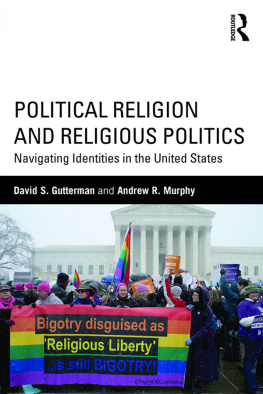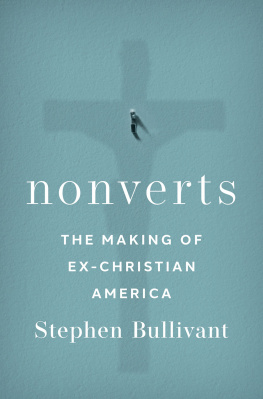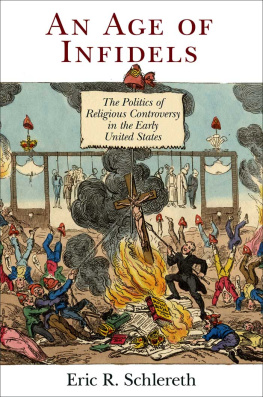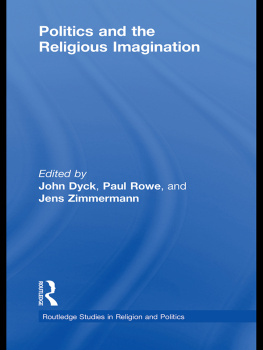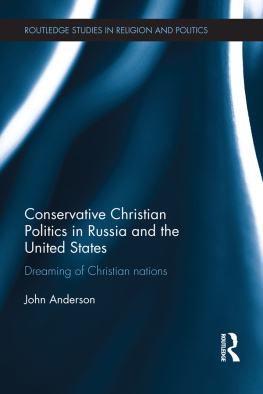Political Religion and Religious Politics
Profound demographic and cultural changes in American society over the last half century have unsettled conventional understandings of the relationship between religious and political identity. The Protestant mainline continues to shrink in numbers, as well as in cultural and political influence. A growing population of American Muslims seek both acceptance and a firmer footing within the nations cultural and political imagination. Debates over contraception, same-sex relationships, and prosperity preaching continue to roil the waters of American cultural politics. Perhaps most remarkably, the fastest-rising religious demographic in most public opinion surveys is none, giving rise to a new demographic that Gutterman and Murphy name Religious Independents. Even the evangelical movement, which powerfully re-entered American politics during the 1970s and 1980s and retains a strong foothold in the Republican Party, has undergone generational turnover and no longer represents a monolithic political bloc.
Political Religion and Religious Politics: Navigating Identities in the United States explores the multifaceted implications of these developments by examining a series of contentious issues in contemporary American politics. Gutterman and Murphy take up the controversy over the Ground Zero Mosque, the political and legal battles over the contraception mandate in the Affordable Health Care Act and the ensuing Supreme Courts Hobby Lobby decision, the national response to the Great Recession and the rise in economic inequality, and battles over public school curricula, seizing on these divisive challenges as opportunities to illuminate the changing role of religion in American public life.
Placing the current moment into historical perspective, and reflecting on the possible future of religion, politics, and cultural conflict in the United States, Gutterman and Murphy explore the cultural and political dynamics of evolving notions of national and religious identity. They argue that questions of religion are questions of identitypersonal, social, and political identityand that they function in many of the same ways as race, sex, gender, and ethnicity in the construction of personal meaning, the fostering of solidarity with others, and the conflict they can occasion in the political arena.
David S. Gutterman is Associate Professor of Politics at Willamette University.
Andrew R. Murphy is Associate Professor of Political Science at Rutgers University.
Routledge Series on Identity Politics
SERIES EDITOR: Alvin B. Tillery, Jr., Northwestern University
Group identities have been an important part of political life in America since the founding of the republic. For most of this long history, the central challenge for activists, politicians, and scholars concerned with the quality of U.S. democracy was the struggle to bring the treatment of ethnic and racial minorities and women in line with the creedal values spelled out in the nations charters of freedom. In the midst of many positive changes, however, glaring inequalities between groups persist. Indeed, ethnic and racial minorities remain far more likely to be undereducated, unemployed, and incarcerated than their counterparts who identify as white. Similarly, both violence and work place discrimination against women remain rampant in U.S. society. The Routledge series on identity politics features works that seek to understand the tension between the great strides our society has made in promoting equality between groups and the residual effects of the ascriptive hierarchies in which the old order was rooted.
Black Politics Today
The Era of Socioeconomic Transition
Theodore J. Davis Jr.
Jim Crow Citizenship
Liberalism and the Southern Defense of Racial Hierarchy
Marek Steedman
The Politics of Race in Latino Communities
Walking the Color Line
Atiya Kai Stokes-Brown
Conservatism in the Black Community
To the Right and Misunderstood
Angela K. Lewis
The Post-Racial Society is Here
Recognition, Critics and the Nation State
Wilbur C. Rich
Race and the Politics of the Exception
Equality, Sovereignty, and American Democracy
Utz McKnight
Barack Obama and the Myth of a Post-Racial America
Edited by Kevern Verney, Mark Ledwidge, and Inderjeet Parmar
American Identity in the Age of Obama
Edited by Amlcar Antonio Barreto and Richard L. OBryant
New Body Politics: Narrating Arab and Black Identity in the Contemporary United States
Ther A. Pickens
American Exceptionalism and the Remains of Race
Edmund Fong
The Political Uses of Motherhood in America
Cynthia Stavrianos
Sexploitation: Sexual Profiling and the Illusion of Gender
Michle Alexandre
Political Religion and Religious Politics: Navigating Identities in the United States
David S. Gutterman and Andrew R. Murphy
First published 2016
by Routledge
711 Third Avenue, New York, NY 10017
And by Routledge
2 Park Square, Milton Park, Abingdon, Oxon OX14 4RN
Routledge is an imprint of the Taylor & Francis Group, an informa business
2016 David S. Gutterman and Andrew R. Murphy
The right of David S. Gutterman and Andrew R. Murphy to be identified as authors of this work has been asserted by them in accordance with sections 77 and 78 of the Copyright, Designs and Patents Act 1988.
All rights reserved. No part of this book may be reprinted or reproduced or utilised in any form or by any electronic, mechanical, or other means, now known or hereafter invented, including photocopying and recording, or in any information storage or retrieval system, without permission in writing from the publishers.
Trademark notice: Product or corporate names may be trademarks or registered trademarks, and are used only for identification and explanation without intent to infringe.
British Library Cataloguing-in-Publication Data
A catalogue record for this book is available from the British Library
Library of Congress Cataloging-in-Publication Data
Gutterman, David S.
Political religion and religious politics : navigating identities in the
United States/ David S. Gutterman and Andrew R. Murphy.
pages cm. (Routledge series on identity politics)
Includes bibliographical references.
1.Religion and politicsUnited States.2.Identification (Religion)
Political aspectsUnited Sates.3.Political cultureUnited
States.I.Murphy, Andrew R., 1967II.Title.
BL2525.G87 2016
322'.10973dc23
2015004907
ISBN: 978-0-415-51823-9 (hbk)
ISBN: 978-0-415-51824-6 (pbk)
ISBN: 978-0-203-12345-4 (ebk)
Typeset in Bembo
by Apex CoVantage, LLC
The challenges of writing about religion in the contemporary United States are many: the terrain changes quickly, the issues are highly charged and far from easy to resolve, and the debates often reach to the core of individual and national identity. These challenges, of course, also make the work more engaging and its significance more acute. Hardly a day goes by when another, often divisive, illustration of the dynamic entanglement of politics and religion in the United States does not occur. We are not alone in trying to understand these transformations and developments: social activists, political parties, culture warriors, members of dwindling congregations, and scholars alike have taken up questions of religion and political identity, albeit in very different ways. In this book, we hope to speak to a broad and diverse audience about the present and future character of religious and political identity in the United States.

